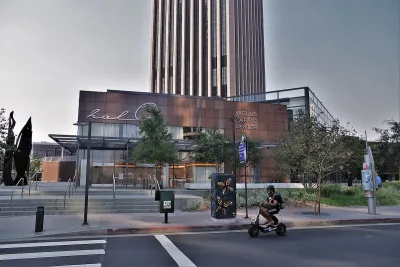The state’s rebate programs for e-bikes and other light electric vehicles are too underfunded to reach many of the Californians who need them most.

In an opinion piece in Smart Cities Dive, Marta Anadón Rosinach argues that California’s approach to clean transportation is leaving behind the lowest-income residents who need it most.
According to Rosinach, “It’s time we rethink the definition of ‘clean mobility’ to include equitable access. A zero-emission car might qualify on paper, but it won’t help a shift worker in Stockton without a dollar to spare or a teenager in San Bernardino commuting to school.” Moreover, buses and trains don’t reach all areas or don’t offer reliable service.
Rosinach calls for a wider adoption of light electric vehicles (LEVs) such as e-bikes, e-scooters, and other small vehicles that can help replace car trips at a lower cost than an electric car. LEVs are “cheaper to own and operate than motor vehicles, require less space and fewer resources, and work well in urban areas.”
Rosinach argues that cities and the state should do more to subsidize the purchase of LEVs, which could be an important mobility lifeline for low-income people. And while the Driving Clean Assistance Program and the California e-bike incentive exist, these programs are limited and underfunded, with e-bike vouchers running out within minutes of their release.
By expanding the e-bike voucher program to include secondhand bikes, the state could make funding go further to help more people. “Even beyond rebates, we need to start treating light electric transportation more like a public good, with dedicated investment into LEV infrastructure. Not just scattered bike lanes, but a statewide network of safe, physically separated routes connecting neighborhoods to schools, jobs and transit.”
FULL STORY: California’s clean mobility push is leaving low-income residents behind

Planetizen Federal Action Tracker
A weekly monitor of how Trump’s orders and actions are impacting planners and planning in America.

Silicon Valley ‘Bike Superhighway’ Awarded $14M State Grant
A Caltrans grant brings the 10-mile Central Bikeway project connecting Santa Clara and East San Jose closer to fruition.

Amtrak Cutting Jobs, Funding to High-Speed Rail
The agency plans to cut 10 percent of its workforce and has confirmed it will not fund new high-speed rail projects.

Washington’s New Rent Cap Set Just Below 10% for 2026
Washington’s statewide cap on annual residential rent increases will be just shy of 10 percent next year, down slightly from its current level.

Nature Starts Here: The Essential Role of Nature Centers and Outdoor Programs
Nature centers and outdoor programs serve as vital gateways to environmental education, equity, and stewardship — bringing people closer to nature and inspiring the next generation to care for the planet.

Opinion: California Clean Transportation Efforts Not Addressing Needs of Low-Income Residents
The state’s rebate programs for e-bikes and other light electric vehicles are too underfunded to reach many of the Californians who need them most.
Urban Design for Planners 1: Software Tools
This six-course series explores essential urban design concepts using open source software and equips planners with the tools they need to participate fully in the urban design process.
Planning for Universal Design
Learn the tools for implementing Universal Design in planning regulations.
Caltrans
City of Fort Worth
New Jersey Institute of Technology
Mpact (founded as Rail~Volution)
City of Camden Redevelopment Agency
City of Portland
City of Laramie





























